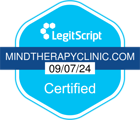OCD Symptoms
Obsessive-Compulsive Disorder is often accompanied by anxiety and depression.
Obsessive-Compulsive Disorder (OCD) is a common, chronic, and long-lasting disorder that affects adults and children all over the world. It is most often treated with medication and psychotherapy. As with other mental disorders, people with OCD often suffer from other maladies, such as anxiety, depression, and body dysmorphic disorder. It is important to consider these disorders when making decisions about treatment. OCD is a chronic condition, and if left untreated, it can be a disabling interference to all aspects of life.
What causes OCD?
The cause of OCD is yet unknown, but there are risk factors. If you've had family members with OCD or have suffered trauma - either physical or sexual, you have a higher risk. Scientists have found differences in the frontal cortex and subcortical structures of the brain in people with OCD. While the research is still undergoing, there appears to be a connection between OCD symptoms and abnormalities in certain areas of the brain.
Obsessive-Compulsive Personality Disorder
If you are preoccupied with orderliness and perfectionism, you might not necessarily have a personality disorder. But, if you need mental and interpersonal control, at the expense of flexibility, openness, and efficiency, you may be at risk. Many people with an obsessive-compulsive personality disorder don’t seek out treatment until the disorder interferes with their lives - when there is stress or other life events that break down their coping resources.
Psychotherapy Treatments
OCD is typically treated with medication and psychotherapy. Research shows that psychotherapy specifically types of cognitive behavior therapy (CBT) can be as effective as medication for some individuals.
Treatments for OCD
Programs for OCD Treatment
Intensive Outpatient Program (IOP)
Partial Hospitalization Program (PHP)
OCD Therapy Groups
Anxiety Group Therapy
Authentic Relating
Balanced Living Group
Cognitive Behavioral Therapy
Distress Tolerance Group
Emotion Regulation Skills
Emotions and Compulsions
Goals Group
Healthy Living
Interpersonal Effectiveness Skills
Mindful Process Group
Mindfulness-Based Group Therapy
Post-Traumatic Growth
Restorative Movement
Self-Compassion Group
Taking Charge Group
Coping with Obsessive Compulsive Disorder
1. Take medication as directed.
Even if you're feeling well, resist any temptation to skip your medications. If you stop, OCD symptoms are likely to return.
2. Join support groups and other healthy outlets!
Support groups for people with OCD can help you reach out to others facing similar challenge.
— Check groups available at Mind Therapy Clinic
3. Learn relaxation & stress management skills.
Try stress management techniques such as meditation, muscle relaxation, deep breathing, yoga tai chi or qi gong.


